|
| |
If it can be grown in soil, the crop will be grown in the Mekong Delta of
Vietnam. Starting south of Ho Chi Minh City, the Mekong Delta is a vast
network of wide, slow flowing rivers all pouring into or anchored by the Mekong
River. Running through China, Myanmar (Burma), Laos, Thailand, and
Cambodia, the Mekong spreads out like fingers in Vietnam.
The network provides water for a variety of crops, the largest of which is
rice. But grown here are tomatoes, mangroves, lettuce, cocoanuts, fruits
of every exotic description, cattle, and on, and on, and on.
Forty or more years ago when I left Saigon, I would have immediately been in
the "boonies". A two lane road took you past rice paddies that
went on forever, elephant ear jungles where at any marker someone could ambush
you in a heartbeat. Unpopulated except for the towns or hamlets along the
way, you were in the countryside.
Today for miles upon miles the four lane road separated into two lanes each
way by a highway type construction concrete barrier, the roadside is packed with
wall to wall shops. On this page is a small example of those shops.
The other chapters Can Tho City and the Can Tho River Market are paradise
in the middle of nowhere and an amazing river market that has existed for 100's
of years.
At one time you crossed the various rivers by ferry, today a very modern,
very beautiful toll bridge has been built by an Australian firm, others are
under construction, but the ferry is still used in many places. If I were
a tourist alone on this trip, traveling in the Delta would be worth the price of
admission.
Visit Can Tho City and enjoy a trip up the
river to the 100's year old River Market.
Bring a cool one or two--it's hot
Here are some pictures of along the way to Can Tho.
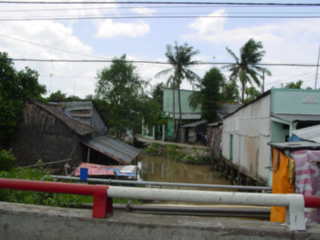 If there's no
river, there is always a creek. Little boats are everywhere here as
a primary means of transportation of everything from produce to
computers. I would not do my clothes in these creeks, either if you
get my drift. The government at all levels tries its best to be
environmentally clean, but centuries old habits are hard to break. If there's no
river, there is always a creek. Little boats are everywhere here as
a primary means of transportation of everything from produce to
computers. I would not do my clothes in these creeks, either if you
get my drift. The government at all levels tries its best to be
environmentally clean, but centuries old habits are hard to break.
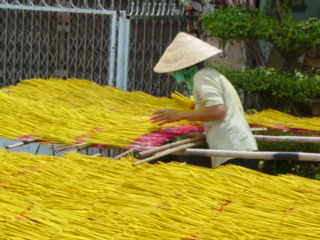 A lady outside her home/shop
dries incense. A lady outside her home/shop
dries incense.
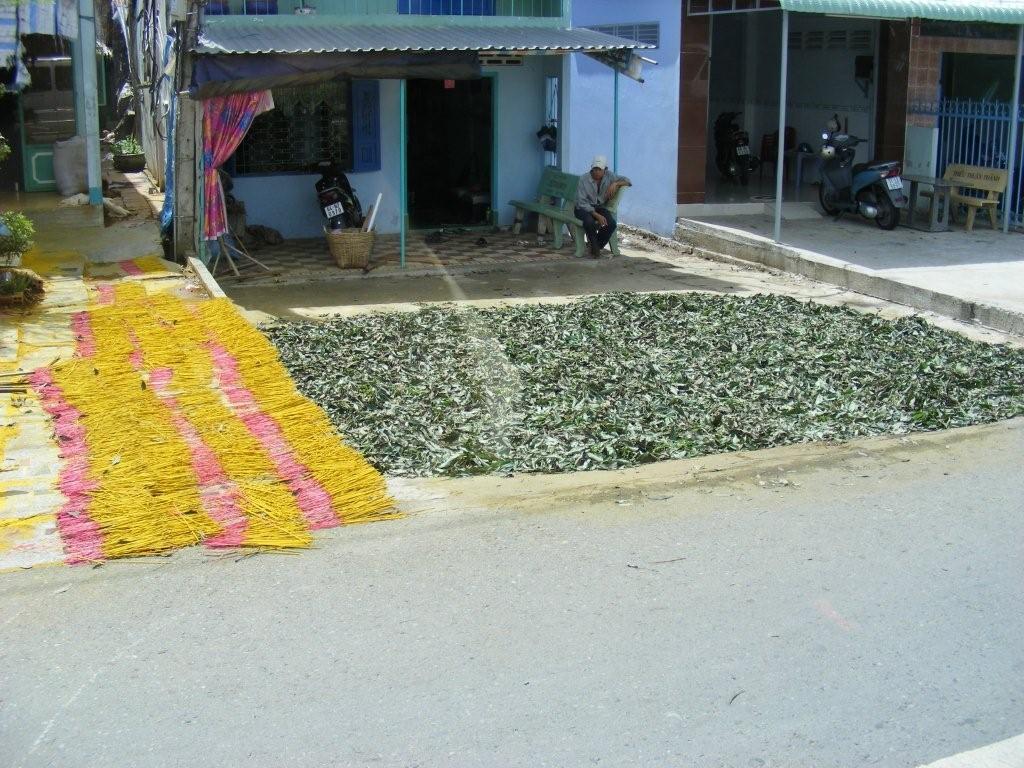 The
leaves to the right are tea leaves. We were told that these would
become the ingredient for incense. The
leaves to the right are tea leaves. We were told that these would
become the ingredient for incense.
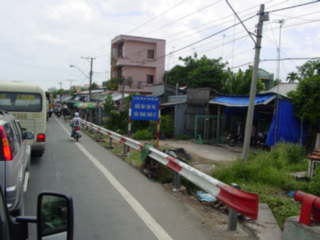 The next series of pictures are
shops. Thee top one is the line starting to form for the ferry still
a couple miles away. This one is that far away because of the one of
the very, very few (2) accidents we saw. Small wonder there are not
more. The next few pictures give you an idea of just how cluttered
the roadside is for 150 miles and why it took five hours to go 150
miles. The return trip on an early Sunday morning took considerably
less time. The next series of pictures are
shops. Thee top one is the line starting to form for the ferry still
a couple miles away. This one is that far away because of the one of
the very, very few (2) accidents we saw. Small wonder there are not
more. The next few pictures give you an idea of just how cluttered
the roadside is for 150 miles and why it took five hours to go 150
miles. The return trip on an early Sunday morning took considerably
less time.
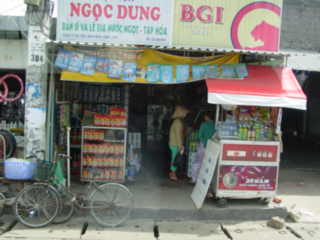
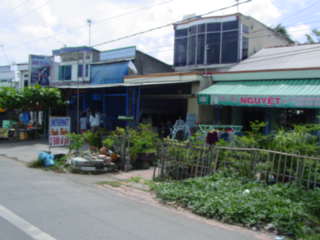
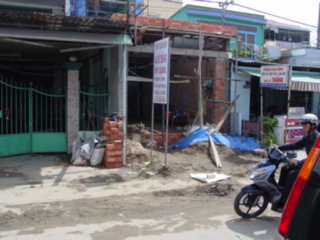 Here, I wanted to get a
shot of the brick work. They use far different brick than we and the
brick work would leave a lot to be desired by our brick layers. No
matter, though. None of it will be exposed. It's all covered
by stucco. Here, I wanted to get a
shot of the brick work. They use far different brick than we and the
brick work would leave a lot to be desired by our brick layers. No
matter, though. None of it will be exposed. It's all covered
by stucco.
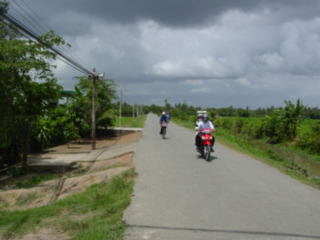 Get off the main road and you
see much narrower what we would call farm to market roads and the roadside
as you can see is not cluttered. Get off the main road and you
see much narrower what we would call farm to market roads and the roadside
as you can see is not cluttered.
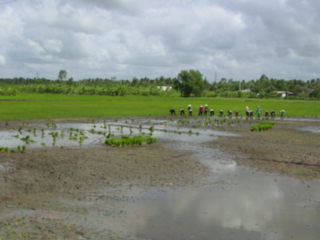 Planting rice by
hand. Forty years ago this work would have been done by older and
younger women. But, the younger people, like here, no longer like,
want, or do this type of labor. Now a mix of old men and women do
the work. EVERYONE works for their keep. In the Delta, the
younger people opt to work in the factories. Planting rice by
hand. Forty years ago this work would have been done by older and
younger women. But, the younger people, like here, no longer like,
want, or do this type of labor. Now a mix of old men and women do
the work. EVERYONE works for their keep. In the Delta, the
younger people opt to work in the factories.
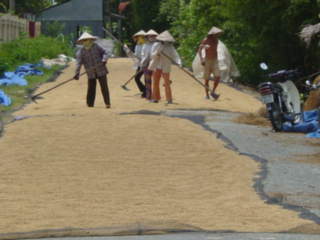 Rice drying on a main road. Rice drying on a main road.
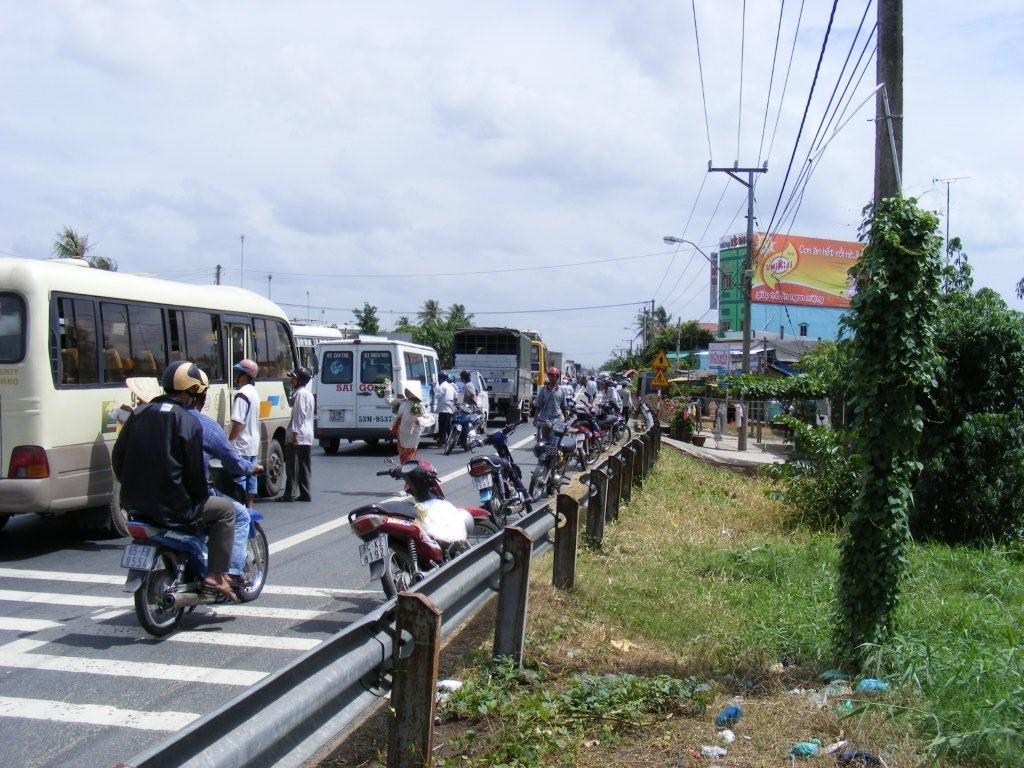 The
line for the ferry begins to thicken. We are about one mile from the
ferry and this is ferry waiting traffic. Once in a town, the traffic
will snake through the area. The
line for the ferry begins to thicken. We are about one mile from the
ferry and this is ferry waiting traffic. Once in a town, the traffic
will snake through the area.
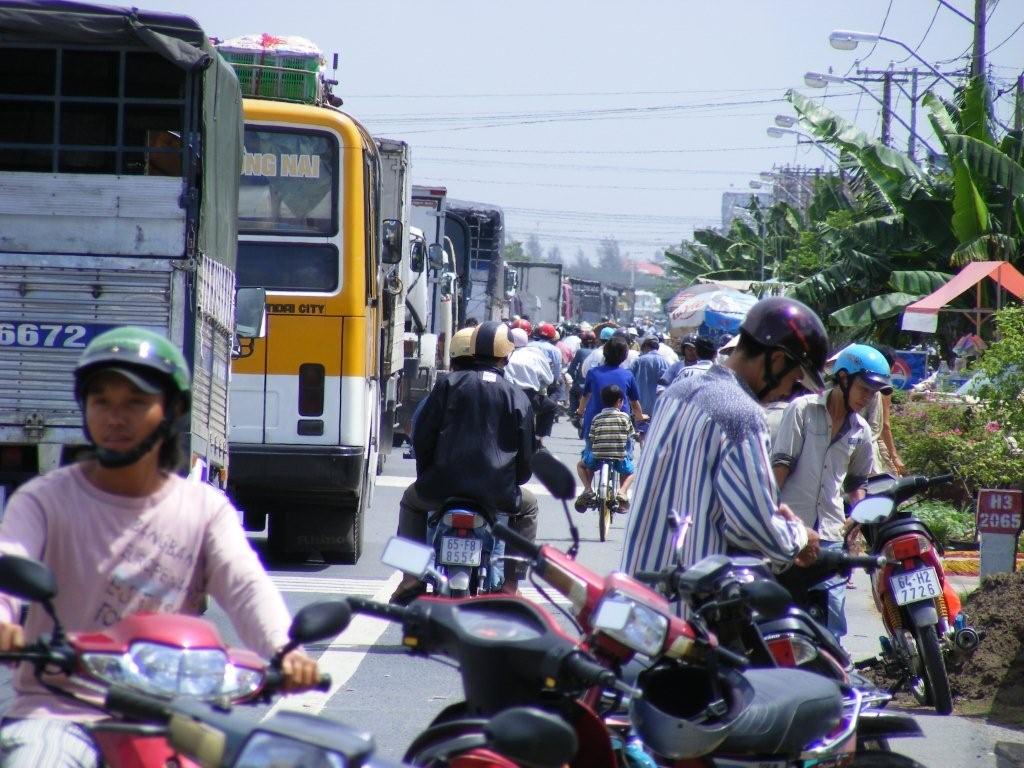
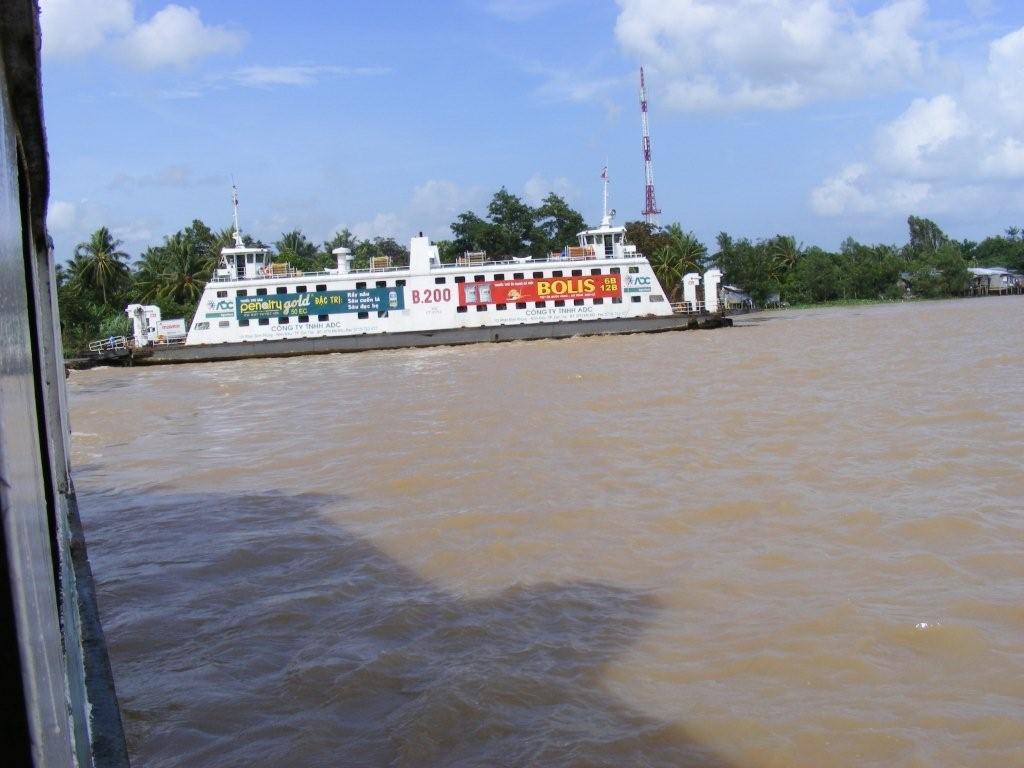 At least
seven ferries were operating the day we were here. There's little
waiting, loading is very organized, no one complains (at least not out
loud). Some ferries just take the motor bikes. There are two
landings about 50 yards apart on each side of the river. I got out
of our van to stretch and look for the facilities (waiting in line does
take its toll). I passed some guys using the river. They just
grinned at me. I couldn't find any facilities, went back to where
the guys were standing in the back, determined windage, and joined
in. When you gotta, you gotta. At least
seven ferries were operating the day we were here. There's little
waiting, loading is very organized, no one complains (at least not out
loud). Some ferries just take the motor bikes. There are two
landings about 50 yards apart on each side of the river. I got out
of our van to stretch and look for the facilities (waiting in line does
take its toll). I passed some guys using the river. They just
grinned at me. I couldn't find any facilities, went back to where
the guys were standing in the back, determined windage, and joined
in. When you gotta, you gotta.
|

|
 The
leaves to the right are tea leaves. We were told that these would
become the ingredient for incense.
The
leaves to the right are tea leaves. We were told that these would
become the ingredient for incense. The
line for the ferry begins to thicken. We are about one mile from the
ferry and this is ferry waiting traffic. Once in a town, the traffic
will snake through the area.
The
line for the ferry begins to thicken. We are about one mile from the
ferry and this is ferry waiting traffic. Once in a town, the traffic
will snake through the area.
 At least
seven ferries were operating the day we were here. There's little
waiting, loading is very organized, no one complains (at least not out
loud). Some ferries just take the motor bikes. There are two
landings about 50 yards apart on each side of the river. I got out
of our van to stretch and look for the facilities (waiting in line does
take its toll). I passed some guys using the river. They just
grinned at me. I couldn't find any facilities, went back to where
the guys were standing in the back, determined windage, and joined
in. When you gotta, you gotta.
At least
seven ferries were operating the day we were here. There's little
waiting, loading is very organized, no one complains (at least not out
loud). Some ferries just take the motor bikes. There are two
landings about 50 yards apart on each side of the river. I got out
of our van to stretch and look for the facilities (waiting in line does
take its toll). I passed some guys using the river. They just
grinned at me. I couldn't find any facilities, went back to where
the guys were standing in the back, determined windage, and joined
in. When you gotta, you gotta.